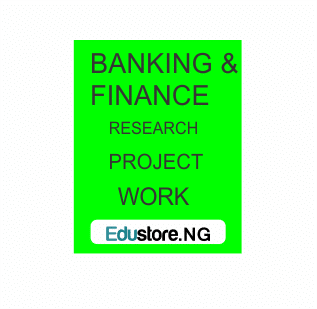Employee Hardiness and Corporate Performance of Deposit Money Banks Rivers State
Abstract
This study was on employee Hardiness and corporate performance of deposit money banks Rivers state. Three objectives were raised which included: To investigate the extent to which employee hardiness is associated with various dimensions of corporate performance in DMBs, to identify the mediating mechanisms through which employee hardiness influences corporate performance in DMBs and to examine the moderating effects of contextual factors. A total of 77 responses were received and validated from the enrolled participants where all respondents were drawn from selected banks in Rivers state. Hypothesis was tested using Chi-Square statistical tool (SPSS).
Chapter one
Introduction
Background of the study
Employee hardiness is a psychological construct that encompasses a set of personality traits enabling individuals to effectively cope with stressors and adversity in the workplace. This concept has garnered significant attention in organizational psychology due to its potential implications for employee well-being and organizational performance. Deposit money banks (DMBs), as critical players in the financial services industry, rely heavily on the performance and resilience of their workforce to navigate through dynamic market conditions and regulatory pressures.
Research suggests a positive relationship between employee hardiness and corporate performance in DMBs. For instance, a study by Akinyele and Adebayo (2019) found that employees with higher levels of hardiness exhibited greater adaptability, resilience, and commitment to organizational goals, consequently contributing to enhanced job performance and overall organizational effectiveness in Nigerian DMBs.
Furthermore, the study conducted by Esen et al. (2020) investigated the impact of employee hardiness on organizational outcomes in the Turkish banking sector, including DMBs. They discovered a significant positive correlation between employee hardiness and job satisfaction, organizational commitment, and performance, indicating that hardy employees are more likely to exhibit positive attitudes and behaviors that contribute to organizational success.
In addition to individual-level outcomes, the collective hardiness of employees within a DMB can also influence broader organizational performance metrics. For example, a resilient workforce is better equipped to navigate through economic downturns, regulatory changes, and competitive pressures, thereby safeguarding the financial stability and reputation of the bank. This assertion is supported by research conducted by Kabir and Rahman (2017), who found that organizational resilience, which is closely linked to employee hardiness, positively influences the financial performance and sustainability of banks in Bangladesh.
It’s important to note that while employee hardiness can bolster corporate performance in DMBs, other organizational factors such as leadership effectiveness, organizational culture, and market conditions also play significant roles in shaping overall performance outcomes. Therefore, DMBs should adopt a holistic approach to talent management and organizational development, which includes fostering employee hardiness alongside other key determinants of success.
Statement of the problem
Employee hardiness is a critical psychological factor that influences how individuals cope with stress and adversity in the workplace. In the context of deposit money banks (DMBs), which are central to the financial services industry, understanding the relationship between employee hardiness and corporate performance is of paramount importance. Despite the theoretical significance of employee hardiness, there remains a gap in empirical research regarding its impact on DMBs’ performance.
There is a paucity of research that comprehensively examines the relationship between employee hardiness and corporate performance within the specific context of DMBs. Existing studies often focus on general organizational outcomes or specific industries, leaving a gap in understanding how employee hardiness specifically affects the performance of DMBs.
The diversity of performance metrics used to assess corporate performance in DMBs raises questions about which specific indicators are most influenced by employee hardiness. While some studies may focus on financial performance measures such as profitability and efficiency ratios, others may consider non-financial indicators such as customer satisfaction and employee turnover rates. Clarifying which performance metrics are most impacted by employee hardiness is essential for developing targeted interventions and strategies.
The mechanisms through which employee hardiness translates into improved corporate performance in DMBs remain unclear. While existing research suggests that hardy employees exhibit greater adaptability, resilience, and commitment, the specific pathways through which these individual-level attributes influence organizational outcomes require further exploration. Identifying potential mediating variables such as organizational culture, leadership style, and employee engagement can provide valuable insights into how DMBs can leverage employee hardiness to enhance performance.
Understanding the relationship between employee hardiness and corporate performance has practical implications for DMBs’ human resource management practices and strategic decision-making processes. However, the lack of empirical evidence directly linking employee hardiness to tangible business outcomes hampers the development and implementation of evidence-based interventions aimed at fostering employee resilience and enhancing organizational performance.
Objective of the study
- To investigate the extent to which employee hardiness is associated with various dimensions of corporate performance in DMBs.
- To identify the mediating mechanisms through which employee hardiness influences corporate performance in DMBs.
- To examine the moderating effects of contextual factors
Research Hypotheses
H1: there is no extent to which employee hardiness is associated with various dimensions of corporate performance in DMBs
H2: there is no mediating mechanisms through which employee hardiness influences corporate performance in DMBs
Significance of the study
This study holds significant implications for academia, industry practitioners, policymakers, and other stakeholders in the banking sector. The following points highlight the significance of the study:
By investigating the relationship between employee hardiness and corporate performance in deposit money banks (DMBs), the study contributes to advancing theoretical knowledge in the fields of organizational psychology, human resource management, and banking management. It fills a gap in the existing literature by providing empirical evidence on the role of employee hardiness in shaping organizational outcomes within the specific context of DMBs.
The findings of the study offer valuable insights for DMBs’ human resource management practices and strategic decision-making processes. Understanding how employee hardiness influences corporate performance can inform the development and implementation of targeted interventions aimed at fostering employee resilience and enhancing organizational effectiveness. This could include initiatives such as training programs, leadership development efforts, and changes to organizational policies and practices.
By elucidating the mechanisms through which employee hardiness influences corporate performance, the study can help DMBs build greater resilience to external challenges and uncertainties. Hardy employees are better equipped to cope with stressors and adversity, thereby enhancing the organization’s ability to adapt, innovate, and thrive in dynamic market conditions and regulatory environments.
The study findings may have implications for regulatory policies governing the banking sector. Policymakers can leverage insights into the relationship between employee hardiness and corporate performance to develop policies that promote workforce well-being, organizational resilience, and overall stability within the banking industry. This could contribute to the sustainability and competitiveness of DMBs in the long term
Scope of the study
The scope of the study covers employee Hardiness and corporate performance of deposit money banks. The study will be limited to selected banks in Rivers state
Limitation of the study
Despite its contributions and significance, it’s important to acknowledge the limitations inherent in this study:
- Cross-Sectional Design: The study’s cross-sectional design limits its ability to establish causal relationships between employee hardiness and corporate performance in DMBs. While correlations can be identified, causality cannot be inferred, and other factors may confound the observed associations. Longitudinal studies would be needed to provide stronger evidence of causality over time.
- Sampling Bias: The study’s findings may be subject to sampling bias, particularly if the sample of DMBs and employees is not representative of the broader population. Sampling from a specific geographic region or focusing on particular types of DMBs may limit the generalizability of the findings to other contexts.
- Self-Report Measures: The reliance on self-report measures for assessing employee hardiness, corporate performance, and other variables introduces the potential for common method bias and social desirability bias. Employees may provide responses that they perceive as favorable or socially acceptable, leading to inaccuracies or inflated estimates of the relationships under study.
- Measurement Error: Despite efforts to use validated scales and rigorous measurement techniques, measurement error may still be present in the study’s operationalizations of employee hardiness, corporate performance, and other constructs. Variability in responses and perceptions among participants could introduce noise into the data, affecting the reliability and validity of the findings.
Definition of terms
- Employee Hardiness: Employee hardiness refers to a psychological construct encompassing a set of personality traits that enable individuals to effectively cope with stressors, challenges, and adversity in the workplace. These traits typically include a sense of commitment, control, and challenge, allowing employees to maintain resilience and adaptability in demanding work environments.
- Corporate Performance: Corporate performance refers to the overall effectiveness and achievement of organizational goals and objectives by a corporation or company. It encompasses various dimensions, including financial performance metrics (e.g., profitability, revenue growth, return on investment), operational efficiency, market share, customer satisfaction, employee engagement, and other indicators of organizational success.
- Deposit Money Banks (DMBs): Deposit Money Banks, also known as commercial banks or retail banks, are financial institutions that primarily engage in accepting deposits from customers and providing loans and other financial services. DMBs play a crucial role in the economy by facilitating the flow of funds between savers and borrowers, managing risk, and contributing to financial intermediation and economic development.
- Organizational Resilience: Organizational resilience refers to the capacity of an organization to withstand and adapt to external disruptions, challenges, and uncertainties while maintaining essential functions, operations, and performance. Resilient organizations can effectively anticipate, respond to, and recover from adverse events or shocks, ensuring continuity and sustainability in the face of change or adversity.
References
- Savery, I.K. Inks. J.A (2000). Long hours at work – are they dangerous and do people consent to them’. Leadership and Organizational Development Journal, [28].
- Selye, N.O. (2011). Occupational Sources of Stress: a Review of the Literature Relating to Coronary Heart Disease and Mental LU. Health, Journal of Occupational Psychology, 23(3):23-56. [29].
- Sundi, K. (2013). Effect of transformational leadership and transactional leadership on employee performance of Konawe Education Department at Southeast Sulawesi. International Journal of Business and Management Invention. [30].
- Venkatruman, H. &Ramanuiam, S. (2006). Managing human resources. Delhi: Parakash Books Ltd. [31].
- Yahaya, A., Yahaya, N., Bon, A.T., Ismail, S. & Noor, N.M. (2012). The relationship between big five personality with work motivation, competitiveness and job satisfaction. Elixir Psychology, 44(a), 7454–7461.
- For Reference Only: Materials are for research, citation, and idea generation purposes and not for submission as your original final year project work.
- Avoid Plagiarism: Do not copy or submit this content as your own project. Doing so may result in academic consequences.
- Use as a Framework: This complete project research material should guide the development of your own final year project work.
- Academic Access: This platform is designed to reduce the stress of visiting school libraries by providing easy access to research materials.
- Institutional Support: Tertiary institutions encourage the review of previous academic works such as journals and theses.
- Open Education: The site is maintained through paid subscriptions to continue offering open access educational resources.





